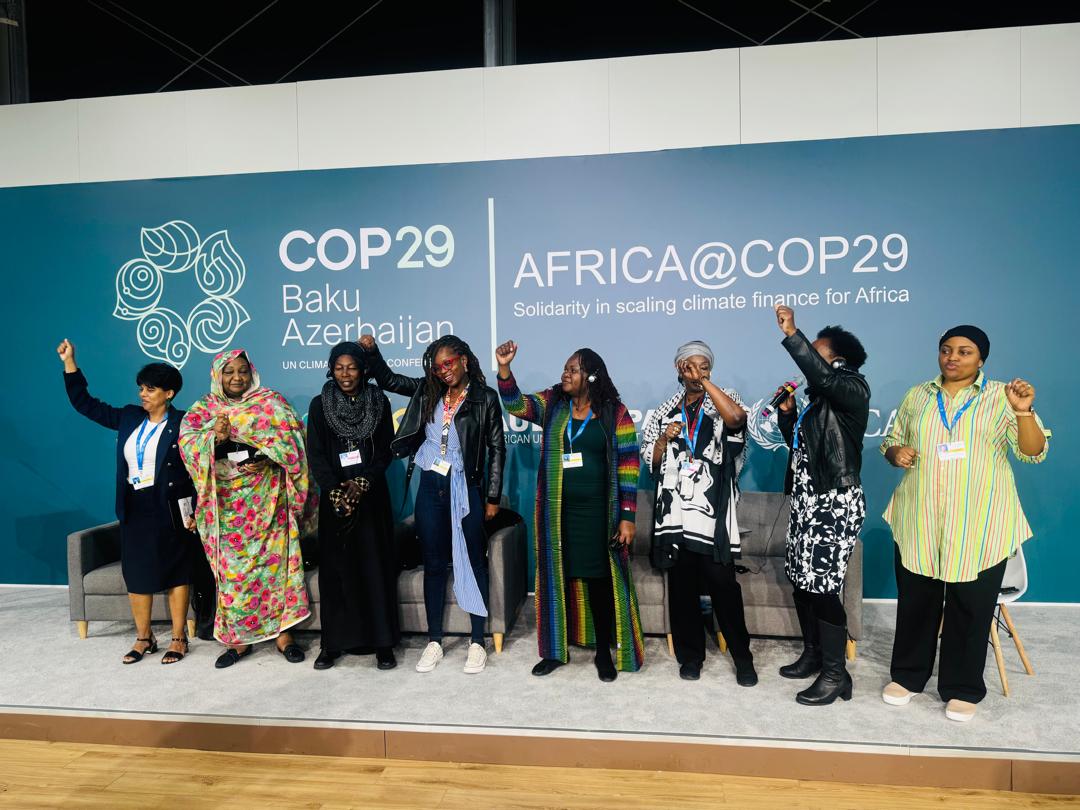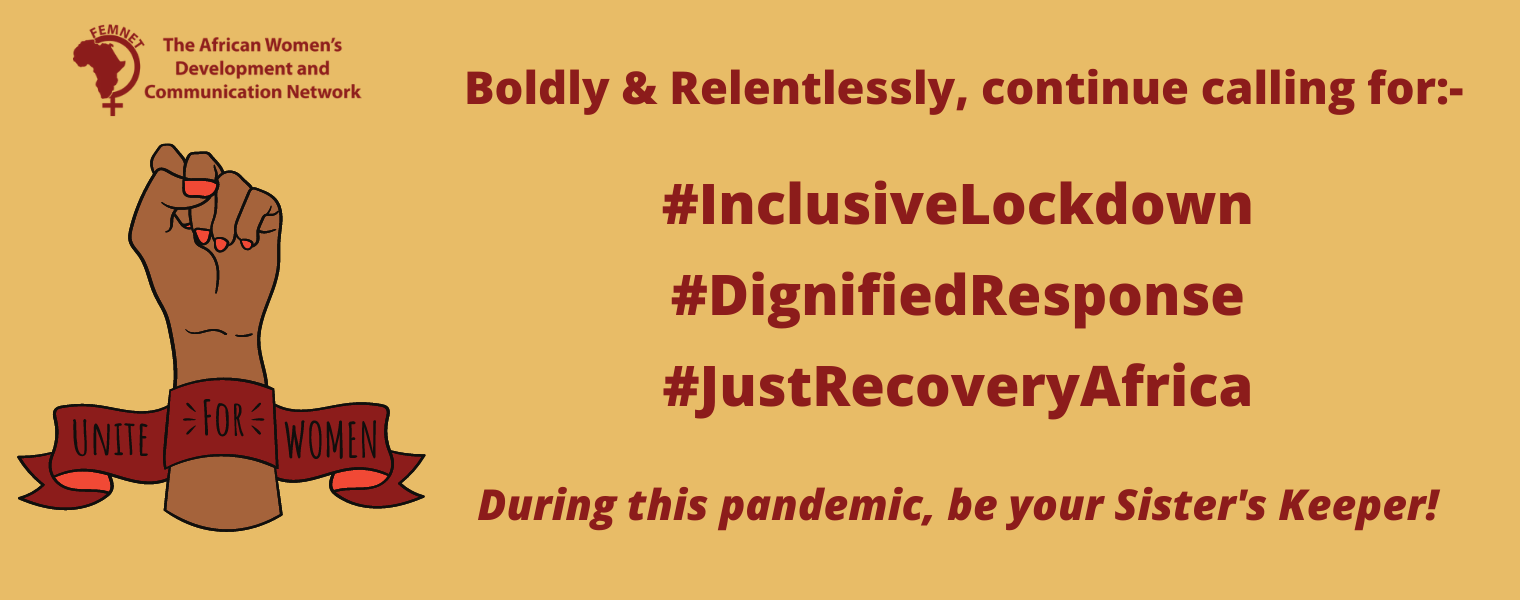
AFRICAN FEMINISTS’ CALL FOR URGENT ACTION AT COP 29
PRESS STATEMENT
Baku, Azerbaijan, November 21st, 2024_As African women, Feminist, girls, and activists represented at COP29 we wish to bring to your attention the concerns and needs of African women based on the development of the negotiations, Africa is grappling with escalating conflicts, the emergence of anti-gender movements and fundamentalism and the relentless onslaught of climate change. The economic landscape has been equally turbulent, with the Global South, particularly Africa, facing a mounting debt crisis.
Many women in the region rely on livelihoods that are climate-sensitive such as small-scale farming and manual labour. This makes them highly exposed to the impacts of extreme weather events such as droughts and floods which damage crops and kill livestock upon which their livelihoods depend. Women in sub-Saharan Africa collectively spend 40 billion hours a year collecting water. If these “unproductive hours” were used elsewhere, the overall society could function more productively.
The U.N. estimates that 80% of people displaced by the climate crisis are women, and even among populations that are not displaced, women often fill societal roles that make them more susceptible to climate shocks. Agriculture is the engine of growth and rural development in Africa. More than 60% of women in sub-Saharan Africa work in agriculture, producing 70% of the continent’s food. Being so dependent on farming means women are more financially vulnerable when climate shocks affect food production.
What is happening in the African region?
Eastern Africa
East Africa is the epicenter of one of the world’s worst climate emergencies, having recently experienced one of the longest and most severe droughts on record, As of 2023 millions were affected by the drought. This includes millions of women of reproductive age who face dangers to their health and risks of gender-based violence due to the drought. Millions have been internally displaced children left malnourished. With millions of livestock being reported dead the region has seen monetary losses resulting in billions of lost in livestock alone. In Ethiopia, due to the severe drought in 40 years, girls have been forced to drop out of school to support the increased burden of household and farm chores, while men and adolescent boys migrate to urban centers looking for work.
Central Africa
Climate change is one of several risks to resources, livelihoods, economies, and ecosystems. Central Africa constitutes part of the rich biodiversity of the Congo basin, with rapid population growth, urbanization, and economic transformation. The subregion is home to 1/3rd of the continent’s population, with agriculture being one of the major sources of livelihood for the people. Faced with the daily risks to crops and livestock due to rising temperatures and heat extremes, water stress, and heavy precipitation events. Women make up 70% of the agrarian population.
Southern Africa
Southern Africa has suffered from climate-related drought, flood, and water crises, which have exacerbated the already-existing energy crisis, economic degrowth, poverty, inequality, and social injustice
North Africa
Across the MENA region, there are 48.7 million adolescent girls, many of whom are increasingly vulnerable to the impacts of climate change. More than ever, these girls live in communities severely affected by drought, where access to basic resources like water and food is becoming scarce. Many face growing fears during the rainy season, as treacherous conditions make walking to school dangerous. Others are forced to migrate with their families, seeking refuge from floods, wildfires, or worsening resource shortages.
West Africa
West Africa is experiencing climate change at rates faster than the global average. Climate change is also interacting with regional political tensions, violent conflicts, and complex humanitarian emergencies. As changing climate conditions impact natural resource availability, biodiversity, and agricultural productivity, low levels of resilience are magnifying the human security implications of climate change in West Africa.
The COP presents an opportunity for vulnerable groups to highlight the issues affecting them, however, several issues should be addressed
Key areas of concern
We note with concern the composition of the women’s delegation and constituted bodies represented at COP 29, especially women from developing countries. Accelerating African women’s leadership in climate action will require an increased number of African women leading climate action and the development of climate solutions.
Demand: We demand 50:50 representations and leadership in climate change negotiations this will ensure we amplify the voices and increase the visibility of African women’s climate change in global and regional dialogues.
- Just Transition
Africa is endowed with vast natural resources, yet a significant portion of its population remains without access to reliable electricity. Over 650 million people in Africa live without electricity, predominantly in rural areas. Roughly 1 billion people lack access to clean cooking. Women represent a largely untapped resource in the energy sector.
Demands: We call for urgent resolution on the just transition, focusing on equity in the shift to green economies. A decision that focuses on the creation of decent and quality jobs and social protection to reduce potential impacts and deployment of cheap solar and wind to address energy efficiency
- Climate-Induced Mobility
Climate-related displacement can perpetuate gender inequalities. Women in developing countries are more likely to be stuck in place while male family members migrate, leaving them in a more vulnerable position. Additionally, when women and girls are displaced, their exposure to gender-based violence, human trafficking, and some forms of modern-day slavery increase. in developing countries, men are more mobile and more likely to migrate to urban areas in search of employment. Conversely, women in developing countries typically face more challenges when it comes to relocating.
Demands: Provide flexible, accessible, and predictable financing models that address the needs of these groups.
- Implementation of the Lima Work Programme on Gender and Gender Action Plan
GAP is essentially a broad framework that identifies key areas and actions to enhance women’s participation and leadership in climate decision-making and to encourage countries to bring gender equality into their climate policies, plans, and strategies.
Demands: Fast-track implementation of the Lima Work Programme on Gender and Gender Action Plan this will include the parties’ appointment of a National Gender and Climate Change Focal Point(s), who play a key role in the implementation of the GAP. This has had opportunities for capacity building, information sharing, and resource mobilization.
- Global Goal on Adaptation
The 2015 Paris Agreement, Article 7 established the global goal of adaptation of enhancing adaptive capacity, strengthening resilience, and reducing vulnerability to climate change, to contribute to sustainable development
Demands: The new goal on adaptation should include the needs of the vulnerable groups, especially women and girls, this must include the means of implementation such as climate finance ring-fenced for the special groups
- New Collective and Quantifiable Goal on Climate Finance
The New Collective Quantified Goal (NCQG) on climate finance is a key element of the 2015 Paris Agreement, aimed at setting a new financial target to support developing countries in their climate actions post-2025. The funding should be accessible, flexible, and predictable. The NCQG should provide for the needs of developing countries and vulnerable groups such as women, girls, indigenous people, and people with disability. the goal must be a gender-responsive manner that catalyzes low-emission, climate-resilient development for vulnerable groups
Demand: The goal must address direct access to grant-based finance for marginalized and vulnerable groups.50% of the proposed 1.3 T USD should be given to women and women-led organizations and the vulnerable groups
Conclusion
We wish to reiterate that lack of accountability and delayed commitments continue to drive women, children, and vulnerable groups to extreme hunger, malnutrition, and poverty thus affecting the attainment of the SDGs and other global goals.
We need to move from boardrooms, science, and action because African, women, girls, and children cannot wait and if there are no commitments, then shut it down!
________________________________________________________________________
This statement has been signed off by FEMNET, alongside partners, African feminist organizations, and activists from UNICEF, Generation Equality Forum, Le Regroupement Communautaire pour l’auto Développement de Familles (RECODEF), Forum for Women in Democracy (FOWODE), Society for Women and Youth Affairs (SWAYA), Odeibea Foundation, Women for a Change, Cameroon (Wfac), Women and Gender Constituency (WGC), and UBUNTU Rural Women and Youth Movement.
For more information contact: Anne Tek, a.tek@femnet.or.ke, Dianarose Odhiambo, d.odhiambo@femnet.or.ke
Related Tags
Related Posts
A #JustRecoveryAfrica!
Global Feminist Collective, Rallying Call to Presidents during the UN General Assembly Special Session on COVID-19 – A
Learn More
